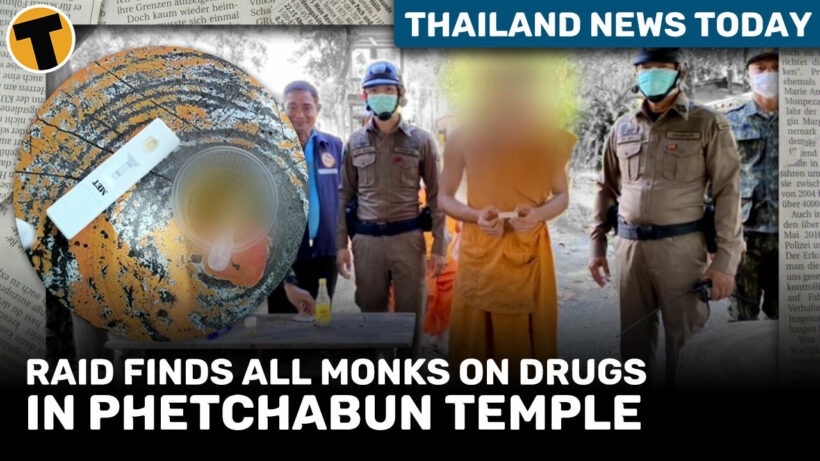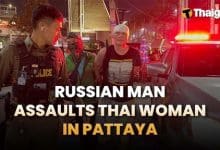Thailand News Today | Raid finds all monks on drugs in Phetchabun temple

Despite conflicting optimistic predictions, the Tourism Authority of Thailand is
warning that Thai tourism may take a sharp downturn next year. While international
travellers are flocking to Thailand now, industry experts fear that it may be a flood of
pent-up demand and, by next year, all those who waited through the whole pandemic
to get to Thailand will have already booked and taken their trips.
The TAT Governor Yuthasak Supasorn explained that, for nearly three years, people
could not travel and take holidays due to Covid-19 pandemic restrictions. Once
Thailand began reopening, many overly eager people raced to enter the country. And
since all the restrictions were lifted last month, many people who have been waiting
impatiently booked their trips to come during this high season.
But, the TAT governor fears that all those people will finish their travel by March, and
tourism in Thailand will see a big dip as factors level out. The reality of global
recession, extreme inflation, and the high prices of plane tickets and travel costs will
set in and cause potential travellers to delay or cancel their holidays.
Still, authorities in Thailand remain hopeful that tourism revenue will continue to
increase next year. Original forecasts expected 1.5 trillion baht in tourist spending this
year, though that number has now been reduced to 1.3 trillion. The average foreigner
is spending about 60,000 baht per trip to Thailand.
The TAT believes that number could be pushed up to about 77,000 baht with various
government incentives, especially offering longer stays.
The final prediction for 2022 was that 10 million people would arrive from abroad by
the end of the year. Now Thailand looks set to surpass that goal, with the 10 millionth
person expected to arrive on December 10. To celebrate, the TAT is planning an
“Amazing Thailand 10 Million Celebrations” promotion to be held at every port of
entry to the country on the 10th.
Authorities are still targeting 20 million arrivals to Thailand next year generating 2.3
trillion baht of revenue from international and domestic tourism. That goal may be
easier or harder to meet depending on the situation with Chinese tourism.
Thai govt to crack down on cybercrime & handout free laptops to poor kids
The Thai government yesterday pledged to crack down on cybercrime and to hand out
13 million free laptops to students from poor or low-income families.
The Digital Economy and Society (DES) Ministry announced plans to administer free
laptops to children from underprivileged families over the next four years starting next
the year under the Smart Thailand scheme.
The Smart Thailand scheme is part of the kingdom’s digital transformation roadmap,
in line with the Thailand 4.0 mission.
Thailand 4.0 is an economic model that aims to unlock the country from several
economic challenges resulting from past economic development models which place
emphasis on agriculture (Thailand 1.0), light industry (Thailand 2.0), and advanced
industry (Thailand 3.0). These challenges include a middle-income trap, an inequality
trap, and an imbalanced trap.
The laptop distribution is part of a collaboration with the Ministry of Education and is
supported financially by the National Broadcasting and Telecommunications
Commission’s (NBTC) fund in a phase-by-phase process. Around one million laptops
are expected to be handed over in phase one.
DES Minister said the Smart Thailand scheme was another landmark for Thailand,
following the infrastructure to develop an existing digital ecosystem.
The minister added that the kingdom is preparing to introduce regulations to
crack down on cybercrime and the use of mule bank accounts. These accounts are set
up using stolen identities and used by scammers to commit illegal transactions via
mobile banking.
He also revealed that digital transformation from 2023 will be pushed forward
following the implementation of cybersecurity-related laws and other regulations,
such as the Personal Data Protection Act and the digital identity law.
Monks behaving badly has become a common trend in Thailand. Reports of monks
stealing cars, fighting, and sneaking out for booze and sex have been increasing in
recent months. One temple was found to be inhabited by Cambodian illegal
immigrants posing as monks and soliciting cash donations to buy drugs. Now one
small temple in Phetchabun has been left empty after every single monk was expelled
for drug use.
The temple, now devoid of any monks, sits in the Bung Sam Phan district of the
Northern province. Reports did not mention the exact location or name of the holy
site. As part of a crackdown in Phetchabun on drugs, police were joined by health
authorities yesterday in raiding the small temple.
Inside they found three monks and the temple abbot. All four were given urine tests
on the spot. All four of them tested positive for illegal drugs in their system.
After the drug tests came back positive, the four monks were stripped of their status
and had no choice but to leave the monkhood.
Now the temple has been left empty and the neighbours don’t know what to do about
it. Aside from villagers being dependent on the monks in the local temple for religious
ceremonies and blessings, problems also arose from the temple’s vacancy.
There is no one left to be responsible for the upkeep of the premises and care for
the temple grounds. Also, the temple has become home to about ten cats and dogs
living in and around the building. Members of the local community worry about what
will happen now after all the monks were busted for illegal drug use.
They have appealed for help from local district officials who in turn contacted the
monastic chief of Bung Sam Phan district. The chief pledged to resolve the situation
by assigning some new monks to the now-abandoned temple.
Cannabis sellers on Khao San Road will be told they must operate their own
smoking places to help keep the local environment free of the pungent smell of
marijuana. The newly built Plantopia zone is one such venue that will allow
cannabis sales and smoking for visitors.
The Department of Thai Traditional and Complementary Medicine had insisted
that licensed cannabis sellers were allowed to distribute cannabis buds, but it was
against the law to allow cannabis-smoking or -eating areas in their shops.
Khao San Business Association president said earlier this week that local
entrepreneurs had already prepared a separate zone for weed selling and smoking
named Plantopia.
He said We are complying with the Public Health Ministry announcement on
cannabis which bans smoking in our shops. Therefore, we have prepared a cigar
bar in Plantopia which is an excluded site away from public areas. We provide
cleaning services and an air-ventilating system at the bar.
He added that he wished to see more support for the recreational use of cannabis,
but concurred there should be designated zones.
When asked to elaborate on the concept of Plantopia, the president said that it is a
hub for cannabis-based products such as cannabis bud extracted oils, cannabis
massage oils, seasonings, and other products.
Hospital Helps Mother for Gauze Left in Her Body
The management of Khon Kaen Hospital apologized and promised assistance for a
piece of gauze left in a woman who gave birth there last month and fell seriously sick
afterward.
Rungnapaporn wrote on Facebook that her younger sister went into labor at a hospital
in Khon Kaen on Oct 3 and last Friday the sister had a high fever and great pain in her
abdomen. The sister’s husband saw a piece of gauze and brought her to Khon Kaen
Hospital. There a doctor removed the gauze. The woman was saved but would have to
receive antibiotics for two more days before being discharged from the hospital.
She said the management of the hospital told her family that it was arranging for
compensation with the Public Health Ministry but if the ministry concluded that the
the hospital was innocent, the family would not receive any assistance.
Later the hospital wrote that its management and medical staff regretted the incident
and would improve their services. The hospital would offer assistance in compliance
with Section 41 of the National Health Security Act for patients’ damage occurring
while receiving treatment at hospitals.
Latest Thailand News
Follow The Thaiger on Google News:


























